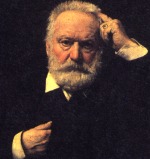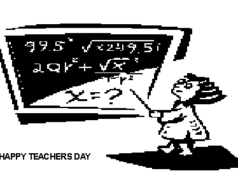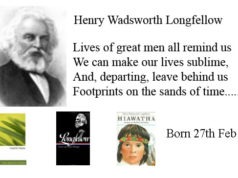
VICTOR MARIE HUGO
(Born 26 Feb 1802-1885)
Les Miserables…Quotes:
Civil War? What does that mean? Is there any foreign war? Isn’t every war fought between men, between brothers? War is modified only by its aim. There’s neither foreign war nor civil war; there’s only unjust and just war.
Saint Denis: Book Thirteen – Chapter Three
We bow to the man who kneels. A faith is necessary to man. Woe to him who believes in nothing. A man is not idle because he is absorbed in though. There is a visible labor, and an invisible labor. To meditate is to labor; to think is to act. Folded arms work, clasped hands perform, a gaze fixed on the heavens work.
Cosette: Book Seven – Chapter Eight
Would you realize what Revolution is, call it Progress; and would you realize what Progress is, call it Tomorrow.
Cosette: Book One – Chapter Seventeen
Hugo, Victor Marie, a French Author, led the romantic movementin French Literature. His writings reveal his love of liberty, his sense of justice and his sympathy with the suffering of ordinary people. Hugo’s The Hunchback of Notre Dame and Les Miserables rank among the most popular fiction written.
Hugo was born in Besancon, the son of an officer in the army of Napoleon I. He spent his first ten years in Corsica, Italy and Spain, where his father was stationed. Hugo’s experiences in those places influenced both him and writings. In 1822, Hugo married his childhood sweetheart, Adele Foucher. About this time, he decided to be a writer. In the preface of his play Cromwell (1827), Hugo demanded freedom of dramatists from the rigid literary rules that governed playwriting. This preface became the principal declaration of French romanticism. Many scholars consider Hugo’s verse drama Hernani (1830) the beginning of the romantic movement in France because of its deliberate break with dramatic conventions. Throughout his life, Hugo composed epic, lyric and satirical poetry.
Hugo wrote Poetry and fiction during the same period that he wrote plays. He published a series of successful books of poetry including The Orientals (1829), Leaves of Autumn (1831), Songs of Twilight (1835), and Rays and shadows (1840). His best known novel during this period was The Hunchback of Notre Dave (1931)
Hugo’s play The Burgraves failed dismally. The same year, his eldest daughter whom he idolized, drowned with her husband. These events, combined with Hugo’s growing interest in politics, lessened his concern with literature. He published nothing for almost ten years but continued to write. He was elected to the New National Assembly in France where he fought for free education and an expansion of voting rights. Due to politic tiff, Hugo went into exile for almost 20 years. He lived in Belgium and then on the island of Jersey in the English Channel. He published The Chastisements, a collection of satirical poems that denounced Napoleon III for destroying the Second Republic. He also published The Contemplations (1856) while in exile, which contains his best lyric poetry. These poems reveal the strong influence of Hugo’s memories of his dead daughter and of his love for her. The Legend of the Centuries (1859), new sections added in 1877 and 1883 and is a masterpiece of Hugo in epic poetry. Les Miserables appeared in 1862.
Hugo became a symbol of freedom to Frenchmen during his years of exile. After the overthrow of Napoleon III in 1870 during the Franco Prussian War, Hugo returned to France in triumph. He spent his final years honoured by his fellow citizens as the champion of democracy and the common people.
QUOTES BY VICTOR HUGO
If a writer wrote merely for his time, I would have to break my pen and throw it away.
Laughter is the sun that drives winter from the human face.
Music expresses that which cannot be put into words and that which cannot remain silent.
What a grand thing, to be loved! What a grander thing still, to love!
Love is like a tree, it grows of its own accord, it puts down deep roots into our whole being.
THE POOR CHILDREN
by: Victor Hugo (1802-1885)
TAKE heed of this small child of earth;
He is great; he hath in him God most high.
Children before their fleshly birth
Are lights alive in the blue sky.
In our light bitter world of wrong
They come; God gives us them awhile.
His speech is in their stammering tongue,
And his forgiveness in their smile.
Their sweet light rests upon our eyes.
Alas! their right to joy is plain.
If they are hungry Paradise
Weeps, and, if cold, Heaven thrills with pain.
The want that saps their sinless flower
Speaks judgment on sin’s ministers.
Man holds an angel in his power.
Ah! deep in Heaven what thunder stirs,
When God seeks out these tender things
Whom in the shadow where we sleep
He sends us clothed about with wings,
And finds them ragged babes that weep!
This English translation of “The Poor Children” was composed by Algernon Charles Swinburne (1837-1909).
– From Poetry Archive







